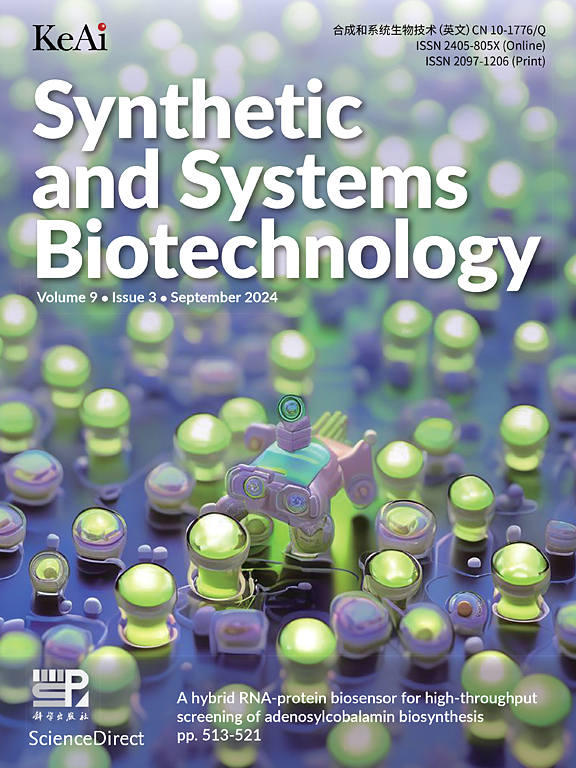Development of a CRISPR/Cas12a genome editing toolbox in Kluyveromyces marxianus and its application in succinic acid biosynthesis
IF 4.4
2区 生物学
Q1 BIOTECHNOLOGY & APPLIED MICROBIOLOGY
引用次数: 0
Abstract
Kluyveromyces marxianus is a promising thermotolerant yeast for industrial biotechnology, but lacks efficient genome engineering tools. A CRISPR/Cas12a genome editing toolbox for K. marxianus was developed for the first time in this study. A plasmid-free transient system achieved single-gene knockout efficiencies of about 50 %–100 % in Δku70 strain. Even with homology arms as short as 35 bp, the knockout efficiency remained 66.67 %. Chromosomal integration of Cas12a enabled single-to-triple fragment knock-ins efficiency of 82.93–85.70 % and 94.50 % for large fragment (>5 kb) integrations. Applying this system, the roles of succinate dehydrogenase (SDH) genes SDH1-SDH5 were elucidated. Combinatorial SDH genes knockouts redirected carbon flux toward succinic acid (SA), but increased glycerol/acetate byproducts. Subsequent GPD1/ACH1/ADH2A co-knockout in a Δsdh1,3,5,4A,2 strain with NDE1 overexpression (YZH43) yielded a chassis producing 32.38 g/L SA from glucose at 37 °C, which is the highest reported titer in K. marxianus, while reducing ethanol, acetate, and glycerol by 60.79 %, 89.24 %, and 67.5 %, respectively. At 46 °C, YZH43 produced 20.51 g/L SA through simultaneous saccharification and fermentation (SSF) using cellulose as substrate. This work provides a high-efficiency CRISPR/Cas12a platform for K. marxianus, enabling rapid metabolic engineering for value-added chemical production, and demonstrates its utility in developing thermotolerant SA-overproducing strains.
马氏克卢维菌CRISPR/Cas12a基因组编辑工具箱的开发及其在琥珀酸生物合成中的应用
马氏克鲁维酵母是一种很有应用前景的耐热酵母,但缺乏有效的基因组工程工具。本研究首次构建了马氏乳杆菌CRISPR/Cas12a基因组编辑工具箱。无质粒瞬时系统在Δku70菌株中实现了约50% - 100%的单基因敲除效率。即使同源臂短至35 bp,敲除效率仍为66.67%。Cas12a染色体整合使单片段到三片段的敲入效率为82.93 - 85.70%,大片段(>5 kb)整合的敲入效率为94.50%。利用该系统,研究了琥珀酸脱氢酶(SDH)基因SDH1-SDH5的作用。组合SDH基因敲除将碳通量转向琥珀酸(SA),但增加了甘油/乙酸副产物。随后,在NDE1过表达(YZH43)的Δsdh1、3、5、4A、2菌株(YZH43)中共敲除GPD1/ACH1/ADH2A,在37℃下从葡萄糖中产生32.38 g/L SA,这是在马氏K. marxianus中报道的最高滴度,同时乙醇、乙酸和甘油分别减少了60.79%、89.24%和67.5%。在46℃下,YZH43以纤维素为底物,通过同时糖化发酵(SSF)产生20.51 g/L SA。这项工作为K. marxianus提供了一个高效的CRISPR/Cas12a平台,实现了增值化学品生产的快速代谢工程,并证明了其在培养耐热sa过量菌株方面的实用性。
本文章由计算机程序翻译,如有差异,请以英文原文为准。
求助全文
约1分钟内获得全文
求助全文
来源期刊

Synthetic and Systems Biotechnology
BIOTECHNOLOGY & APPLIED MICROBIOLOGY-
CiteScore
6.90
自引率
12.50%
发文量
90
审稿时长
67 days
期刊介绍:
Synthetic and Systems Biotechnology aims to promote the communication of original research in synthetic and systems biology, with strong emphasis on applications towards biotechnology. This journal is a quarterly peer-reviewed journal led by Editor-in-Chief Lixin Zhang. The journal publishes high-quality research; focusing on integrative approaches to enable the understanding and design of biological systems, and research to develop the application of systems and synthetic biology to natural systems. This journal will publish Articles, Short notes, Methods, Mini Reviews, Commentary and Conference reviews.
 求助内容:
求助内容: 应助结果提醒方式:
应助结果提醒方式:


